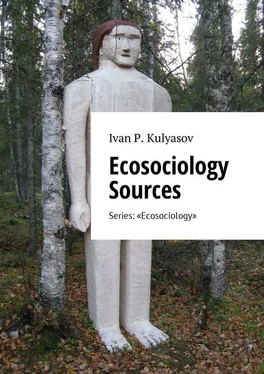I. Kulyasov - Ecosociology Sources. Series - «Ecosociology»
Здесь есть возможность читать онлайн «I. Kulyasov - Ecosociology Sources. Series - «Ecosociology»» — ознакомительный отрывок электронной книги совершенно бесплатно, а после прочтения отрывка купить полную версию. В некоторых случаях можно слушать аудио, скачать через торрент в формате fb2 и присутствует краткое содержание. ISBN: , Жанр: Прочая научная литература, на английском языке. Описание произведения, (предисловие) а так же отзывы посетителей доступны на портале библиотеки ЛибКат.
- Название:Ecosociology Sources. Series: «Ecosociology»
- Автор:
- Жанр:
- Год:неизвестен
- ISBN:9785449009913
- Рейтинг книги:5 / 5. Голосов: 1
-
Избранное:Добавить в избранное
- Отзывы:
-
Ваша оценка:
- 100
- 1
- 2
- 3
- 4
- 5
Ecosociology Sources. Series: «Ecosociology»: краткое содержание, описание и аннотация
Предлагаем к чтению аннотацию, описание, краткое содержание или предисловие (зависит от того, что написал сам автор книги «Ecosociology Sources. Series: «Ecosociology»»). Если вы не нашли необходимую информацию о книге — напишите в комментариях, мы постараемся отыскать её.
Ecosociology Sources. Series: «Ecosociology» — читать онлайн ознакомительный отрывок
Ниже представлен текст книги, разбитый по страницам. Система сохранения места последней прочитанной страницы, позволяет с удобством читать онлайн бесплатно книгу «Ecosociology Sources. Series: «Ecosociology»», без необходимости каждый раз заново искать на чём Вы остановились. Поставьте закладку, и сможете в любой момент перейти на страницу, на которой закончили чтение.
Интервал:
Закладка:
For example, demand for ecologically clean products has grown, causing structural and technological adjustments in industry, i.e., a modernization. An increase in the government annuity for natural resource use and penalties for pollution would also encourage modernization of industry (improvements in the technology used for extraction of natural resources), reduce generation of waste, save energy, and introduce recycling, closed and waste-free production cycles. This would also lead to changes in corporate culture – acceptance of the sustainable development concept, greater responsibility of business for socio-ecological consequences of its activities.
In addition to being a state, national strategy, ecopolicy is becoming a strategy pursued by international companies and corporations. They declare that, if used rationally, global natural resources are virtually inexhaustible and can satisfy the needs of the humanity indefinitely. Even if some resources are depleted, new technology would be able to provide new materials and products of a better, or, as a minimum, the same quality.
Problems of growth would remain in the form of demographic, informational and other “explosions”, which look catastrophically from the local management level, but can be dealt with via development and implementation of global programs. All interested organizations and individuals, who will form a new global design, could now be involved in a constructive dialog and decision-making process.
Therefore, those environmentalists, who had opposed industrialization, technocracy and bureaucracy in the 1970s, lost much of their popularity in the environmental movement by the 1990s. However, the first works published in the 1980s by authors who opined that management, industry and technology, which ensure the high standard of life of the modern society, were not ecologically dangerous per se and that they could be changed for the benefit of the environment, still were criticized.
In contrast with their European colleagues, the American environmentalists, who in the 1980s participated in numerous public organizations, state-run ecological councils and research expert groups, enjoyed the support from the population, government and business, were more optimistic. A considerable part of the United States environmentalists was hoping that ecological problems could be addressed via improvements in technology and management techniques, distribution of benefits, conservation and accumulation of the national natural wealth.
The intellectual breakthrough occurred in the 1980s when Josef Huber proposed his ecological modernization concept 38 38 Huber J. Die veriorene unschuld der okologie: Neue technologien und susperindustrielle entwicklung. Frangfurt-Main: Fisher Verlag. 1982.; Die regenbogengesellschaft: Okologie und sozialpolotic. Frankfurt am Main: Fisher Verlag. 1985. (all in German)
, which in the 1990s evolved into a scientific theory supported by business and the government. The theory of ecological modernization became quite popular among the European environmentalists, which allowed moving from confrontation to dialog and partnership with the state and business.
The ideas of ecological modernization are now largely accepted by the global environmentalist movement and implemented practically from the individual to state level. Because of scientific debate and hands-on experience, the theory of ecological modernization has gone through several stages of development and received both recognition and criticism. Several authors have proposed a number of development classifications. Historical and modern application examples have been studied, and a number of methodological approaches, allowing identification of independent lines of research, elaborated. This we will consider in more detail in the chapter “ Modernist theories ”.
Russian authors of environmental theories
In Russia, just like in the West, environmental theories were used by authors who included the natural context into their studies of social phenomena, who spoke of the mutual influence between humans and the natural environment and made interesting unusual conclusions. In doing so, they made a significant contribution in the development of sociology and the rise and development of ecosociology.
The specifics of Russian history make possible to split this scientific reflection into three periods – pre-Soviet, Soviet and post-Soviet. All Russian authors could be classified into those who represented the organic (sociological naturalism) and geographic school (social evolutionism), as it was done for non-Russian authors. However, for Russian authors, a division between these schools and principles would be quite notional.
Nikolay Dmitrievich Nozhin (1841—1866) had a considerable influence on his contemporaries, including sociologists. His views and publications are a good example showing the notional character of classification into scientific schools. As a biologist and a sociologist, he recognized Darwin’s biological evolution; however, he opposed Malthusianism and racism typical for some social-Darwinists. He was the first to propose an organic approach and formulated its main principles.
The main postulate goes that biological laws apply to human communities just as they do in animal species communities. Therefore, known biological laws could be used for explaining social phenomena and processes. A good example would be collective organizations – free associations of people based on the principles of solidarity and mutual assistance 39 39 Nozhin N.D. Our science and scientists: books and publications // Bulletin of Books. St. Petersburg.1866. №1—3, 7. (in Russian)
.
He criticized political experts and economists for seeing contradiction where, from the biology’s point of view, they did not exist. In biology, multi-functionality does more for survival of specie than functional development within the specie. This provision is analogous to the multi-functionality of peasants and artisans and division of labor in the course of industrial production. Therefore, crises and creative regress of participants are inevitable for industrial production. He believed that his conclusions and their propagation would serve the practical purpose of science – helping people to avoid mistakes in choosing their path of development. In his opinion, dividing science into social and natural disciplines was one of these mistakes.
Aleksandr Ivanovich Stronin (1826—1889) in 1869—1885, published a three-volume edition titled “ History and method ” (on evolution of research methods and approaches taken by social sciences), “ Politics as a science ” (on social structures – groups, statuses) and “ History of the public ” (on evolution of society). His works show the desire to link the methodology for social and natural sciences. He believed that, as the natural and social environments are a whole, analogy could become the basic unifying method. The laws discovered in natural sciences can apply to social sciences. Realizing that scientific experiments cannot and should not be made on humans, he used the philosophic method of separating particulars from universals to construct an ideal particular model of a social phenomenon 40 40 Stronin A.I. History and method. St. Petersburg. 1869.; Politics as a science. St. Petersburg. 1872.; History of the public. St. Petersburg. 1885. (all in Russian)
.
This ideal social model, that was analogous to reality, could already be used for experimenting, theoretically placed in a modified environment, to obtain new knowledge, which could be subsequently verified in another analogous place and situation. This method, in different variations, was widely used at that time and is still used in sociology as Max Weber’s method for forming ideal types.
Читать дальшеИнтервал:
Закладка:
Похожие книги на «Ecosociology Sources. Series: «Ecosociology»»
Представляем Вашему вниманию похожие книги на «Ecosociology Sources. Series: «Ecosociology»» списком для выбора. Мы отобрали схожую по названию и смыслу литературу в надежде предоставить читателям больше вариантов отыскать новые, интересные, ещё непрочитанные произведения.
Обсуждение, отзывы о книге «Ecosociology Sources. Series: «Ecosociology»» и просто собственные мнения читателей. Оставьте ваши комментарии, напишите, что Вы думаете о произведении, его смысле или главных героях. Укажите что конкретно понравилось, а что нет, и почему Вы так считаете.




![Джеймс Купер - Пионеры, или У истоков Саскуиханны [The Pioneers, or The sources of the Susquehannah]](/books/395797/dzhejms-kuper-pionery-ili-u-istokov-saskuihanny-t-thumb.webp)







